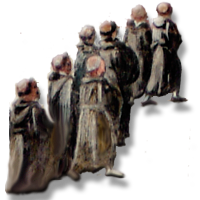Michael Hackett was born in the city of Limerick, Ireland, on 10 August, 1921. He enter the novitiate of the Augustinian Order at Orlagh in 1939 and made his first profession in 1940 when he took the religious name Benedict. He studied Arts at University College, Dublin, and graduated with the degree of B.A. in 1943 with first-class honors (in medieval and modern history). After completing his studies in theology, he was ordained priest in 1947.
He studied for the degree of M.A. in medieval history under Professor Aubrey Gwynn, Professor of Medieval History. The subject of the dissertation was William Fleet (c. 1325-90), O.S.A. Professor Gwynn was so impressed by the outstanding quality of the thesis, which he adjudged to be far above the standard required for the degree of master, that he recommended it for the degree of Ph.D. The thesis was submitted for examination to Professor David Knowles, then Regius Professor of Modern History at the University of Cambridge. He unreservedly commended the thesis, and the degree of Ph.D. was awarded by the National University of Ireland in 1955.
Father Hackett also obtained the Diploma of Higher Education from the same university and another diploma in Medieval Latin Palaeography which he studied under Professor Ludwig Bieler of Vienna for whom the Chair of Palaeography and Late Latin had been especially created at University College, Dublin. On the strength of his academic record and learned publications Father Hackett was awarded honoris causa the title of Licenciate in Philosophy (L.Ph.) by the Prior General of his Order in Rome. In 1976 he was elected Fellow of the Royal Historical Society (F.R.H.S.) of Great Britain on the recommendation of Professor Owen Chadwick, then Regius Professor of Modern History at the University of Cambridge.
Father Hackett was a foundation member of the History Students' Society, University College, Dublin, and of the Augustinian Historical Institute, Rome. In addition to being Fellow of the Royal Historical Society, he was a member of the Ecclesiastical History Society of Great Britain.
He lectured at King's College, Cambridge, and held seminars at Corpus Christi College, Oxford, and at University College, Dublin, on the origins and medieval constitution of the University of Cambridge. The history of the medieval universities, particularly Cambridge and Oxford, were the subject of deep and most fruitful research on his part. It was his unique distinction to have rediscovered the original thirteenth-century statutes of the University of Cambridge which formed the core of his epoch-making study of the foundation and statutory history of the medieval university. His work The Original Statutes of Cambridge University: the Text and its History was published by Cambridge University Press in 1970. His researches also extended to the early history of Oxford University and he was requested to write the chapter on the medieval constitution of the university for volume one of The History of the University of Oxford, which appeared in 1984.
But most of his historical work lay in the field of medieval Augustinian history with special reference to England and Italy, as will be evident from the annexed bibliography. He was the recognized authority on the fourteenth-century Austin friar, William Flete, and his pivotal role in connection with the theological formation of the celebrated mystic, Saint Catherine of Siena. He was one of the principal speakers at the international symposium held at the University of Siena in 1980 to commemorate the 600th anniversary of the saint’s death. That same year he was invited to deliver the first of the two principal addresses at the Fifth Patristic, Medieval and Renaissance Conference at Villanova University, Pennsylvania. During his visit to the United States in the Fall of 1980, Father Hackett also lectured at the South Central Conference on Christianity and Literature (sponsored by Xavier University of Louisiana) at New Orleans, as well as at Berkeley and Cleveland.
Father Hackett also did important historical research necessary for the cause for canonization of John Stone, English Augustinian martyr under Henry VIII to come to come to fruition. He also contributed to the historical research for the beatification of the Irish Augustinian martyr, William Tirry. He was also consulted by the Congregation for Saints in several other causes.
In addition to the many published materials listed below in the bibliography, Father Hackett gave many addresses on various occasions both within the Order and at the meetings of various organizations.
Father Hackett conducted his research and writing while holding various positions within the Order. He was sent to serve in England where he was stationed at Clare Priory in Suffolk and at St. Augustine's Hammersmith, London. From 1966 to 1973 he was major superior of the Augustinians in England and Scotland. From 1974-1983, He taught history at Austin Friars School, Carlisle. From 1983 to 1989 he served Assistant General of the Augustinian Order with residence in Rome. When he returned to England, he resided at St. Mary’s Priory, Harborne, Birmingham. Because of increasing infirmity in his last few years, he resided in St. Joseph's Home, Harborne. He died on 28 March 2005 and is buried in the cemetery of St. Mary's Parish, Harborne, Birmingham.
fonte: www.villanova.edu



